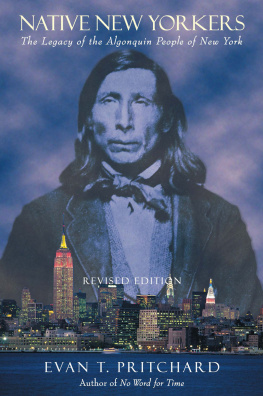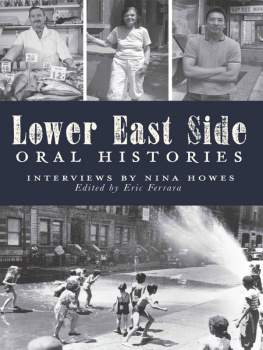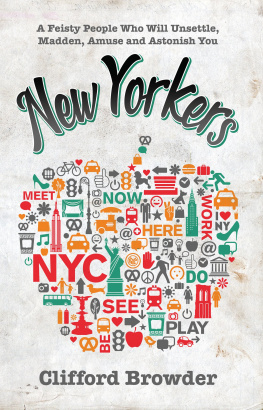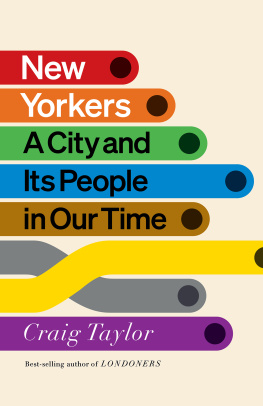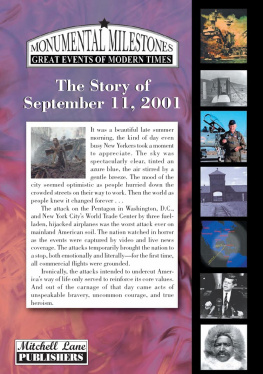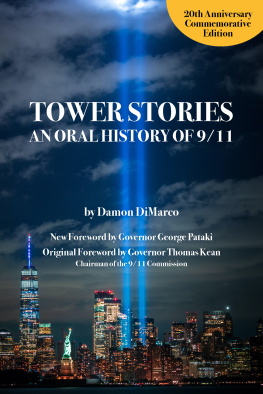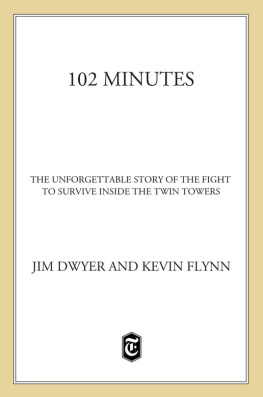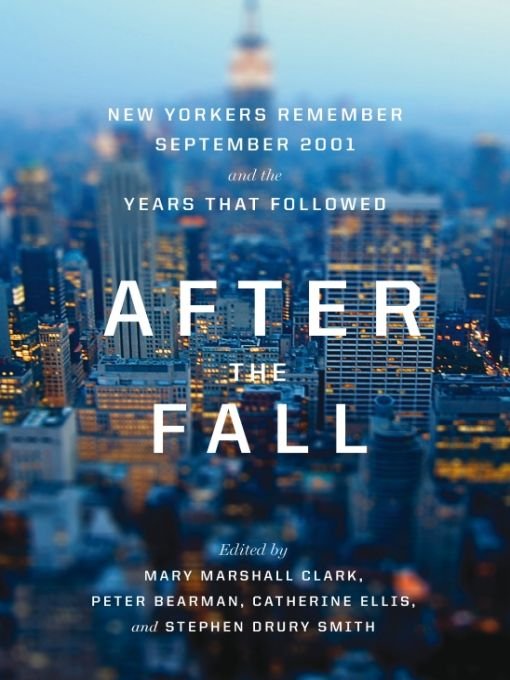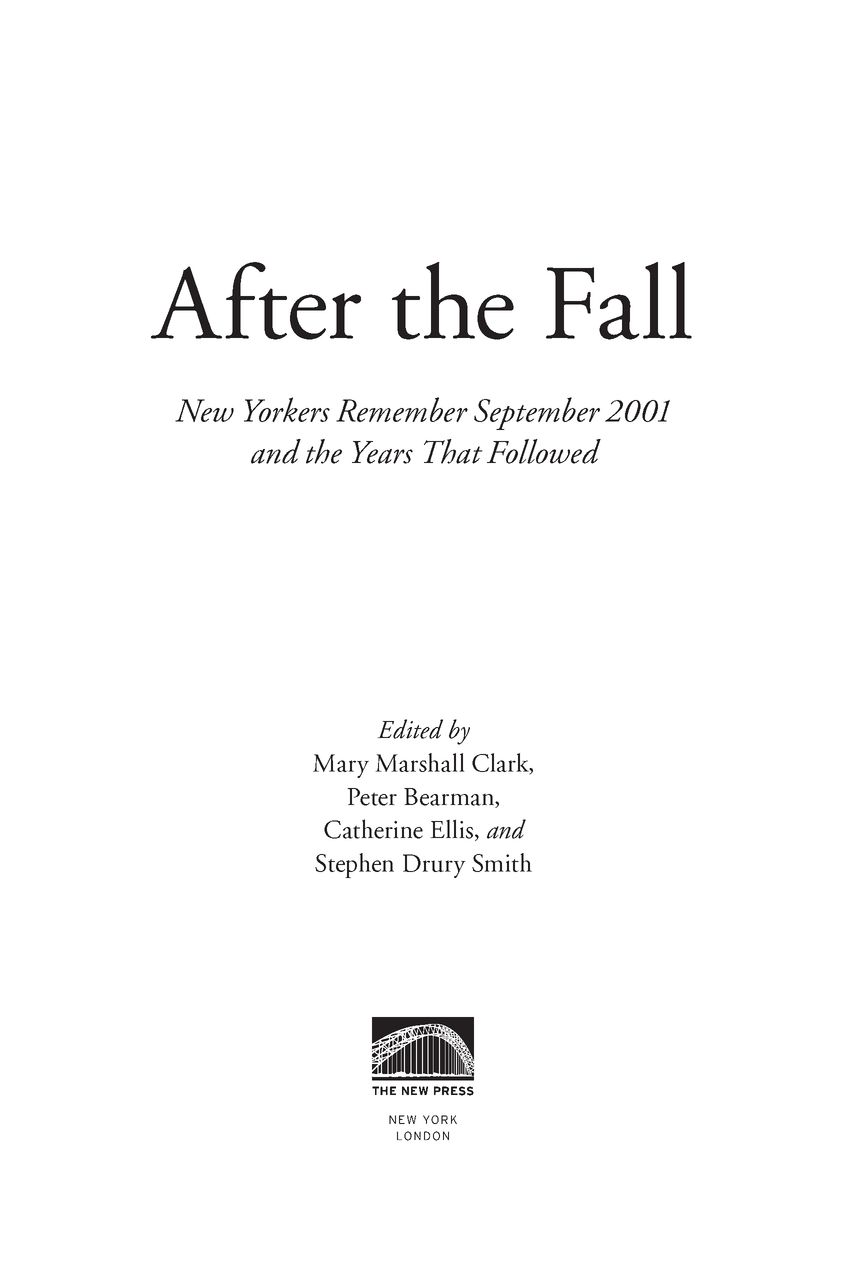Table of Contents
About the Transcripts
This anthology of September 11, 2001, stories is based on oral history interviews conducted by Columbia Universitys Oral History Research Office in collaboration with the Institute for Social and Economic Research and Policy. Some of the subjects were interviewed once, others multiple times over the course of several years. Some interviews were relatively brief; many lasted for hours. The interviews were recorded and later transcribed.
All of the interviews presented here have been greatly condensed from their original lengths. Our goal is to provide as wide a range of narrators and experiences as possible within the word limits of a single volume. The stories presented here were edited to suit the demands of the printed page while staying true to the core of each storytellers particular voice and narrative. Verbal mannerisms that are tolerated by the ear can clutter and clog a written sentence; a thicket of small obstacles, such as you know and I was, like, saying, has been cleared to allow ideas, details, and events to travel more easily.
In some of these narratives, separate interviews are combined to provide the most coherent or complete recollection of events. These are indicated by dates that are joined into one interview heading. In other cases, selections from second and third interviews are set apart to reveal how the persons reflections and reactions changed over time.
The original interviews and their complete transcripts are available at the Columbia University Oral History Research Office in New York City. The website is: http://www.columbia.edu/cu/lweb/indiv/oral/index.html.
Oral History Research Office
Columbia University
801 Butler Library, Box 20
535 W. 114th St., MC 1129, New York, NY 10027
Phone: (212) 854-7083
oralhist@libraries.cul.columbia.edu
Brief Time LineSeptember 11, 2001
7:598:42 A.M. (EDT): Nineteen terrorists are aboard as four American passenger airliners take off on transcontinental flights. The hijacked planes are carrying 246 passengers and crew.
8:46 A.M.: American Airlines Flight 11 crashes into World Trade Center Tower One.
8:50 A.M.: A New York Fire Department battalion chief who witnessed the crash establishes an initial command post in the lobby of Tower One.
9:03 A.M.: United Airlines Flight 175 crashes into World Trade Center Tower Two.
9:37 A.M.: American Airlines Flight 77 crashes into the Pentagon.
9:59 A.M.: Tower Two collapses.
10:03 A.M. (approximately): United Airlines Flight 93 crashes near Shanksville, PA.
10:29 A.M.: Tower One collapses.
5:21 P.M.: Seven World Trade Center collapses.
Over the course of the day some 25,000 New Yorkers evacuated lower Manhattan. More than two hundred fire units and more than one hundred ambulances responded.
Some three thousand people died in New York, Pennsylvania, and Washington, D.C.
Sources: The 9/11 Commission Report; Fire Department of New York / McKinsey and Co. report; news reports.
Acknowledgments
Oral history is created through multiple authorship. The two main authors are the narrators, who tell their stories, and the interviewers, who listen. But there are many others who ensure that the words spoken are transcribed, reviewed for accuracy, sent back to narrators for their own editing, and cataloged, indexed, and deposited into permanent archives. There are also those who preserve digital media, securing it for the future, preparing aural and video files for dissemination. All of these steps are essential for ensuring the long-term survival of archives like the September 11, 2001 Oral History Narrative and Memory Project and related oral history projects we undertook in the long aftermath of September 11, 2001. In the deepest sense, all of these participants are also authors of the archive. We can name some, but not all, of the people, organizations, and funders who supported the creation of an archive of nearly one thousand hours of testimony, six hundred of which at this time of writing are fully accessible to the public.
First, and foremost, we must thank our funders. Those include: the National Science Foundation, the Rockefeller Foundation, the New York Times Foundations Neediest Fund, and very importantly, Columbia University itself. People who made that funding possible include James Neal, Director of the Columbia Libraries; Jonathan Cole, then Provost of Columbia; Lynn Szwaja of the Rockefeller Foundation; and Jack Rosenthal of the New York Times Foundation, who also directed the New York Times 9/11 Neediest Fund. There were those who inspired, supported, or participated in the creation of the September 11, 2001 Oral History Narrative and Memory Project including Robert Smith, our co-principal investigator, responsible for supervising interviews with Mexicans and Latinos ; Kenneth Jackson, Manning Marable, and Patricia OToole, faculty at Columbia who supported the idea of the project early on; as well as Margaret Crocco of Teachers College; Alessandro Portelli, whose oral history of Rome at a time of crisis inspired our belief that we could attempt to record a collective memory of crisis in New York; and Daniel Wolfe, who walked from lower Manhattan up to Columbia University on the day of September 11, 2001, to attend an oral history seminar because he believed oral history was important.
The staff of the Oral History Research Office who supervised the processing of the interviews and supported our interviewers include: Rachel Kleinman, our first project manager; Gregory Culler, project manager who oversaw the huge project of processing interviews into the archive; Jessica Wiederhorn, former associate director; Rosemary Newham, former assistant director and office managers Rachel Solomon, Kate Foster, Courtney Smith, and Jenny Dalbert. Most recently, Corie Trancho-Robie, our former assistant director, worked tirelessly to ensure that the final processing and preservation of our digital files took place. Charis Shafer, office manager, has made our transcripts and media files available to countless researchers. Credit for the creation of a permanent digital repository for the audio and video files goes to Stephen Davis and Janet Gertz of the Columbia Libraries, who saw to it that hundreds of hours of interviews recorded on mini-disks were transferred to high-resolution digital files. Len Morris and his expert crew of Galen Films shot beautiful video interviews of a selection of our narrators in 2005.
Graduate research assistants who listened to large portions of hours we collected, checking transcripts, security legal releases, and writing catalog entries include: Margaret Bryer Gloria Colom, Nikki DErrico, Whitney Krahn, Marilyn Krieger, Dave Loerke, Emily Long, Cynthia-Marie M. OBrien, Jennifer Oh, Lucas Perkins, Courtney Smith, Shalini Tripathi, Rebeccah Welch, Ben Wright, and Grace Zhou. Undergraduate research assistants include: Patrick Alexander, Becky Besdin, Sam Daly, Devon Gallegos, Elizabeth Grefrath, Caronae Howell, Norly Jean-Charles, Neha Nimmagudda, and Min Jeong Yoon. Transcribers Rose Heridia and Deborah Lattimore, among others, devoted hundreds of hours to the careful translation of oral speech into prose. Russell Merritt accomplished the careful and slow work of cataloging the interviews. The Columbia Libraries and the Institute for Social and Economic Research and Policy at Columbia gave outstanding administrative support in managing complex budgets and reporting, including Kristine Kavanaugh, Joel Fine, Dana Connolly, and Leah Lubin. Beryl Abrams, associate general counsel at Columbia, provided invaluable advice about how to protect the rights of those we interviewed in many different contexts.


